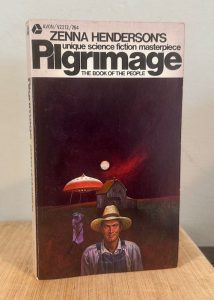I’ve caught colds my entire life; two or three a year. I sneeze, cough, and it usually starts with a sore throat. (Whereas I very rarely have gotten flues, with a temperature and symptoms that go on for a week.) The last time I caught a cold was in January, following our holiday overlay in Las Vegas. Now, after returning from Austin last weekend, I’ve caught another. In a rush as we left Larry’s house and went directly to the airport, I wore casual clothes and was not carrying a mask (such as I usually wear on airplane flights given my imuno-suppressed status). So, serves me right, I suppose.
That’s why no post yesterday.
Yet last night my partner said an interesting thing. We were talking to his kids on the phone, who were planning a Father’s Day lunch for us on Sunday. He mentioned to them I had a cold, so we probably could not join them. Later I said I probably picked something up on the plane, since I didn’t wear a mask. He said no, no, it’s because we were in a very hot climate for several days (95F in Austin everyday) and then returned to a cool climate (lower 70s most days). He’s said things like this before, and usually I don’t respond. He grew up in China, and comments like this one suggests to me that he retains a deep cultural belief in Chinese medicine, what with all its herbs and teas and how cold weather brings on cold viruses. Despite his Ph.D. in biochemistry that he acquired in the US.
This time I said, what? You don’t believe in the germ theory of medicine? He didn’t reply.
\\
With little energy except to sample a few books in between naps, these past couple days, this afternoon I picked up (prompted by a Facebook comment) a book of stories by Zenna Henderson, one of the few female SF writers in the 1950s and 1960s. Henderson was famous for a series of stories about “The People,” published in The Magazine of Fantasy and Science Fiction across those two decades, about a colony of humanoid aliens stranded on Earth after their spaceship crashed. The stories — which I first read decades ago — have a pastoral feel, and are very family- and village-oriented, much like The Little House on the Prairie, the TV show in the ’70s. I remember them fondly, but as I sat down today, I asked myself: in what way are these “people” (note of course that every tribe, no matter isolated, of humans around the Earth refer to themselves by some variant of “the people”) different or alike from humans?
Here we go. I should have guessed. Since they’re *aliens*, they of course have psi powers. They can levitate, read each other’s minds, move objects with their minds (telekinesis). How are they *like* humans? Well, they can mate with actual, Earth-born humans.
This is all extremely unlikely, of course, given any understanding of modern science — as I’ve gone on about on this blog for years. ESP powers have essentially been ruled out by the physicists’ understanding of the range of forces in the universe; there are no gaps, no intervals left for for the as-yet undiscovered forces that ESP powers would have to work through. And genetics suggests the extreme unlikelihood of two species from other planets — or even, on Earth, two remote species from other continents, like kangaroos and bears — being mutually compatible for reproduction.
So my suspicious is that these notions have continued throughout most or nearly all of modern science fiction, not just in the popular TV/movie franchises, but in most SF literature as well (which is increasingly looking more and more like fantasy).
So if my idea of ‘honest’ or even ‘philosophical’ science fiction as being some kind of ideal, I have to admit it’s an unpopular ideal, and I should turn to trying to understand why obsolete SF, relying on all those obsolete scientific notions, is so popular. That’s easy enough in once sense: just as in politics, people follow stories, and intuitive physics; never mind reality. But I need to do better than that.






